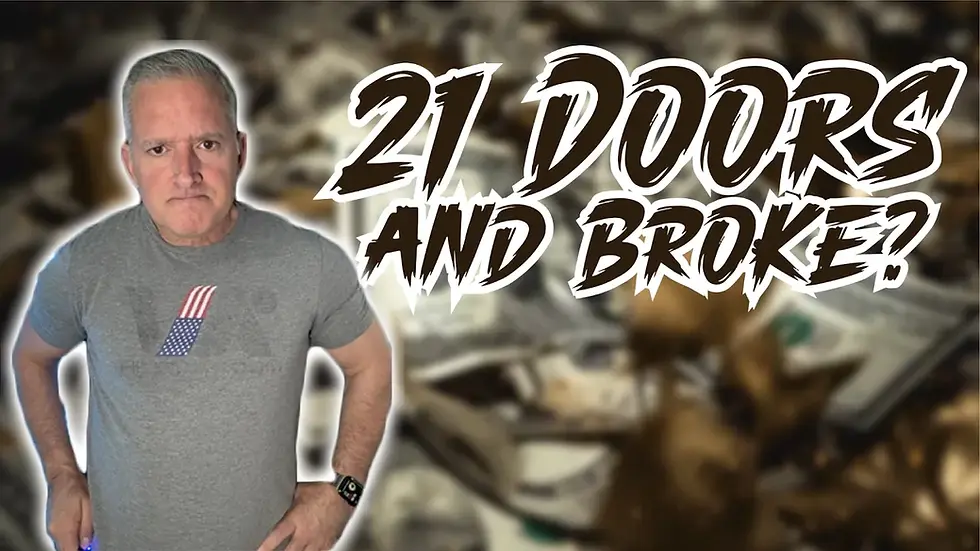Lessons Learned from Buying 21 Rental Units: A Candid Journey
- john.irizarry
- Mar 24
- 4 min read

Real estate investing is often hailed as a pathway to financial freedom, but the journey can be fraught with unexpected challenges. In my case, purchasing 21 rental units in just two years turned out to be one of the most daunting experiences of my life. Here, I'll share the raw, unfiltered lessons I've learned from my journey, the pitfalls I've encountered, and the insights that could help you navigate your own path in real estate investing.
Starting My Real Estate Journey
Back in January 2019, I took my first leap into real estate. While still on active duty, I bought my first flip, inspired by a coach who encouraged me to keep looking for opportunities. I quickly found two rental properties, and before I knew it, I was managing my first two units under rehab.
The allure of flipping houses was exciting, but owning rentals felt like a long-term game. The idea was simple: buy a property, fix it up, rent it out, and let the tenants pay off the mortgage while building wealth. But as I would soon learn, the reality is much more complex.
Scaling Up: From 0 to 21 Units
Fast forward to 2021, I had scaled my portfolio to 21 rental units, including single-family homes, small multifamilies, and even a few Section 8 rentals. On paper, it looked like I was on the brink of financial success. However, I quickly discovered that more doors do not always equate to more profit.
One of the biggest misconceptions in real estate is the illusion of cash flow. Everyone loves to boast about how much they make per door, but the reality is that unexpected expenses can wipe out profits faster than you can count. A sudden roof replacement costing $10,000 or an HVAC system failure can quickly drain your cash reserves.
The Illusion of Cash Flow
Let’s break down the math. If I had 21 units at $600 cash flow per door, that’s $12,600 a month or $151,200 a year. Sounds great, right? But once bills hit, it’s a different story. Major repairs, tenant evictions, and turnover costs can eat away at your profits. Real estate is not the passive income stream it’s often portrayed to be; it requires active management.
At one point, I found myself equity-rich but cash-poor. My balance sheet showed millions in property value, but I struggled to cover basic expenses. It’s like owning a Ferrari but having no gas in the tank. Tapping into that equity isn’t straightforward either; selling creates a taxable event, and refinancing depends on cash flow, which I lacked.
The Nightmare of Property Management
As I scaled, managing my properties became increasingly challenging. Initially, I self-managed to save costs, but as my portfolio expanded, I realized I needed help. I hired a property manager, only to find myself dealing with a “money magician” who was moving funds around in ways I couldn't track. Rent payments would come in, but by the time I received my cut, it felt like something was missing.
Things got worse with my second property manager, who literally got me arrested due to negligence. He failed to respond to a basic code violation, resulting in a bench warrant for my arrest. It was a wake-up call: bad property managers can destroy your business.
Lessons Learned and Moving Forward
If I could do it all over again, I would focus on fewer, more profitable properties. A duplex that generates $1,500 a month is far better than five units making $300 each. Additionally, I learned the hard way about the importance of maintaining a significant cash reserve. Initially, I thought 3 to 6 months of reserves was sufficient, but I now recommend at least 12 months to weather unexpected storms.
Another critical lesson was the need to vet property managers like your life depends on it—because it might. I started my own property management company to ensure better oversight, but if I ever hire again, I’ll check every reference and review meticulously.
Multiple Streams of Income
Real estate alone isn’t enough. I needed additional income streams, whether through coaching or side businesses, to cover unexpected expenses. Until you build a solid portfolio, don’t rely solely on one income source.
In summary, real estate can be a powerful wealth-building tool if done correctly. Don’t rush; it’s a marathon, not a sprint. Avoid overextending yourself and chasing unit counts like I did. And for the love of everything, vet your property managers thoroughly.
Final Thoughts
Learning from my experiences has been invaluable. Real estate investing offers fantastic opportunities, but it also comes with significant risks. If you’re just getting started, take your time, analyze your options, and remember that you’re building a business, not just accumulating properties.
If you’ve had your fair share of nightmare tenants or property managers, I want to hear your stories! Drop a comment below. And if you haven’t yet, make sure to hit that subscribe button for more insights into real estate investing. Until next time, aim high!
Unlock Your Potential in Real Estate
Are you a veteran or first responder ready to start your journey to financial freedom through real estate investing? Visit Bud Evans Consulting for a free strategy session. Whether you're interested in wholesaling, flipping properties, or building a passive income portfolio, I’m here to help you create a customized plan to achieve your goals. Don’t wait—take action now and turn your dreams of financial freedom into reality!

Check out my YouTube!
I post real estate investment videos weekly!

コメント